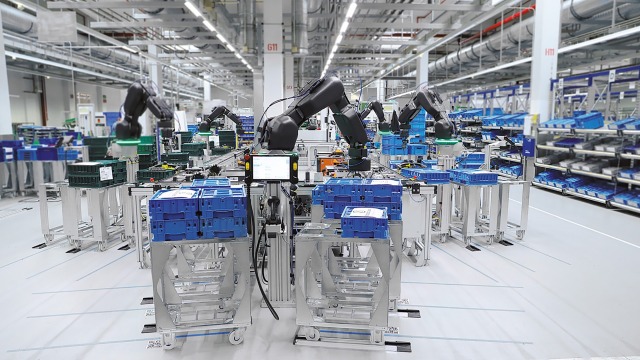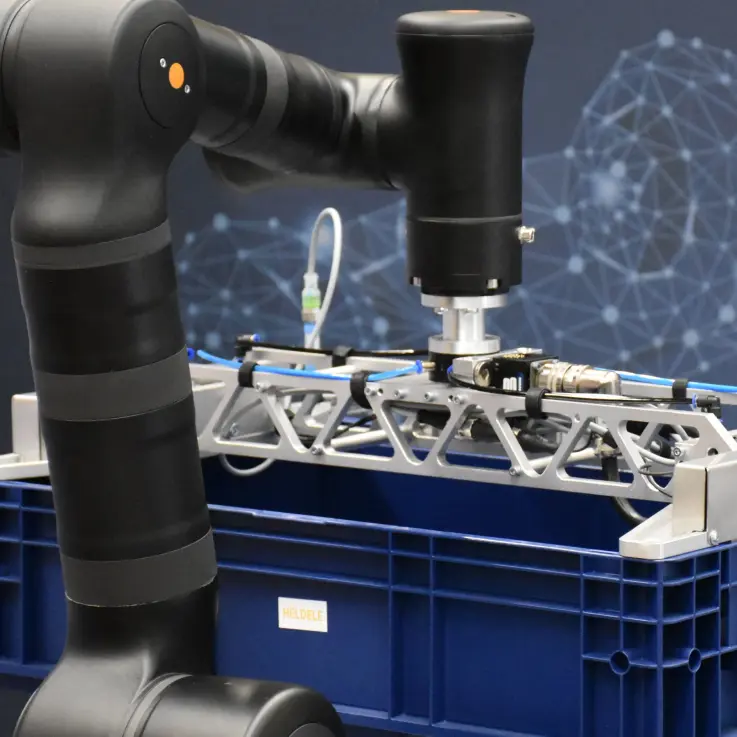



Kraus currently sees robotics growing along two axes. On the one hand, there are applications that rely on simple operability - a market that manufacturers such as Universal Robots dominate with cobots. On the other hand, there are complex, individualized applications that require specific expertise.

A central topic of the discussion was the importance of system integrators. They continue to play a key role, particularly in the implementation of complex applications. However, the market for simple applications is shrinking - customers are increasingly integrating such systems themselves. For integrators, this means specializing in more demanding tasks such as AI-based robotics or modular approaches.
A large part of the discussion revolved around AI-supported robotics. Kraus described how AI is capable of transforming not only robotics itself, but also the entire engineering process. New simulation tools and synthetic data generation could help engineers work more efficiently and reduce costly hours.
According to Kraus, an exciting market is emerging between robotics manufacturers and integrators. Companies such as NVIDIA and Intrinsic are pushing into this area with platforms and offering tools for the development and integration of AI models. At the same time, there is still room for start-ups that specialize in niches such as vision systems or the generation of synthetic data.

ROS (Robot Operating System) also played a central role in the discussion. Kraus emphasized that ROS has a strong position in research and development in particular, but is now also gaining a foothold in industry. Suppliers such as UR and Yaskawa are beginning to integrate ROS into their control systems. The ability to quickly test and validate new technologies such as AI is particularly attractive.
However, the issue of real-time capability remains a critical point. While ROS2 offers improvements here, it remains challenging to meet industry requirements in terms of determinism and stability.
Another exciting aspect is the discussion about world models for robots. Universities and companies such as Stanford, MIT and Toyota Research are currently working on models that will enable robots to better understand their environment.
According to Werner Kraus, we will see a large number of such foundation models in the future, tailored to specific applications and robot types. This could give rise to new business models, for example by generating domain data or synthetic data to train AI models.
You can find this and other episodes from various subject areas on our tech-podcast channel “Industrie neu gedacht” or on all known platforms.
Want to listen to the episode directly? (only available in german)
Robotics is undergoing dynamic change, characterized by two development streams: user-friendly applications and complex, individualized solutions. System integrators are facing the challenge of moving from simple tasks to AI-supported robotics and modular concepts. The integration of AI, driven by new platforms and simulation technologies, holds enormous potential for increasing efficiency in engineering and production processes. ROS is gaining in importance, while the development of world models could fundamentally change robotics. The future of robotics promises new business models in the field of domain and synthetic data. Companies that invest now in training their employees and researching new technologies will be successful in this forward-looking market.
Interview guest:
Dr. Werner Kraus
Position:
Head of Robotics, Fraunhofer IPA
Already networked on LinkedIn?
Rexroth LinkedIn profile:
Contact Tech-Podcast:
